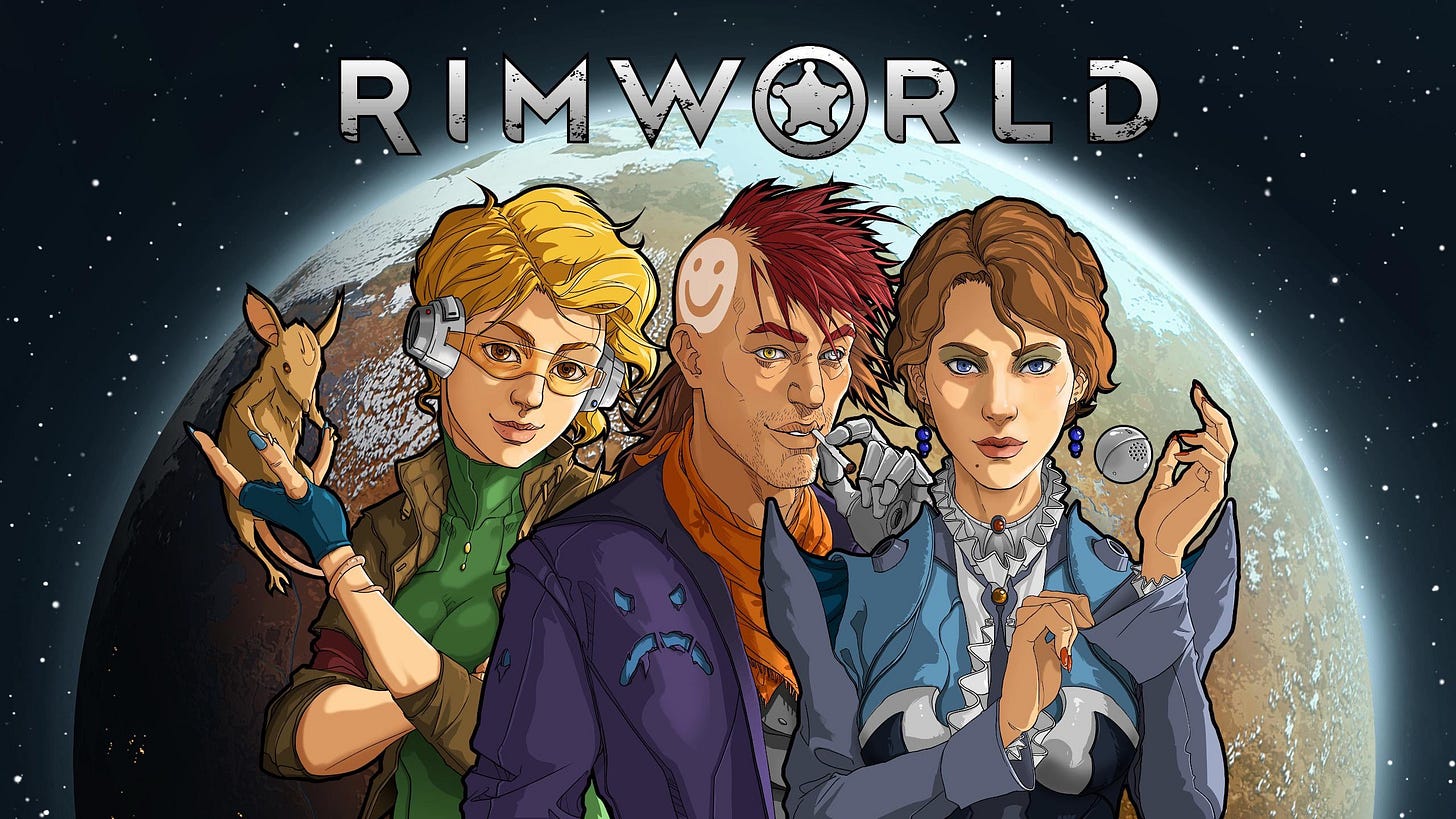Writer's Diary: Troubleshooting
Thoughts and commentary on the second chapter of Rainbow Station: A Ship Called Aspiration
You can think of this as a commentary track for the second chapter of Rainbow Station: A Ship Called Aspiration (Troubleshooting), so you should definitely read that first before reading this.
These were my thoughts as I was writing the piece, facets I’m considering as I move forward, things I was worrying about, and so on. Feel free to ask any questions about the piece below in the comments and I’ll try to answer as best I can.

One of the most difficult writing exercises I've ever heard of was to describe a person who was simply waiting for a bus, alone. The goal was to tell the reader that this person was mourning their child's death without ever stating directly that their child had died.
It's an exercise in metaphor, subtext, and description, in showing something hyper-specific while trying to avoid telling instead of showing.
But the difficulty isn't actually coming from trying to describe their grief. It's coming from the fact the character is entirely alone. Trying to make a story compelling when the only thing they have to compete against is the environment around them is incredibly difficult. This was my biggest worry as I sat down to work on Troubleshooting: Leah is alone on Aspiration (at least, at the beginning of the chapter), with nothing else but her own thoughts. The only dialogue that occurs in this chapter is in the memory that she recalls as she works on wiring up the power to the computer, and when she is speaking to herself.
I had executed a similar exercise before in my second book when I'd written a chapter where the character is entirely alone and trapped in a prison cell. But it was difficult, and I worried, similar to this chapter, that I wasn't going to make it compelling.
Dialogue comes easily to me, so not only was writing a chapter with minimal dialogue difficult, but there was also the difficulty in trying to figure out what parts of the system needed to be worked on first. I worried a lot that this chapter would be boring, as Leah simply struggled through determining which system needed to be brought up first. Luckily, I'd figured out certain aspects of the ship prior to writing it, so I'd thought a lot about which parts of the ship already existed, which parts of the ship would be needed for Leah’s eventual plan, etc.
But describing someone who is essentially trying to renovate a derelict spaceship wouldn’t (on the surface) make for the most compelling stories. What are they competing with, fighting with except the consequence of time? It's like reading a novel about someone renovating an old house. Certainly, some people find this interesting, but it can't be many.
Returning to my goal of writing a story for people like myself has been helpful in remembering that someone will probably find this interesting. My partner and I play a lot of colony simulation games, like "Rimworld", where you have to figure out very specific details of how to run a colony. Where does the food come from, for example? How do you generate heat? Answering these questions and solving these problems are really interesting to me.

Some of my favorite parts of my favorite novels actually have little to do with the characters themselves, and everything to do with the character solving a problem that natural occurs as a result of the world they live in. In the Name of the Wind by Patrick Rothfuss, my comfort book, the best part of the novel is when the character is living on his own, homeless, in the city of Tarbean. He has to figure out where to live, what to eat, how to make money. Answering these questions are difficult in the best of circumstances, but even harder when you’re twelve and living entirely alone in a foreign city with no money and no family.
But I also didn’t want to raise all of these questions. I was at my writer’s group about a month ago, talking about the first fifty pages of my friends memoir. In my opinion, it gave a bit too much backstory, which at times made the first chapter feel clunky and awkward. However, I’d read this story many times before, so I wasn’t a completely unbiased reader. It was much more interesting to hear the reaction of another member of the group who’d never read the memoir before, and how she ended up having many, many more questions as a result of the first chapter. You want to pique someones interest, but you don’t want to make them wish for all the answers all at once. You have to establish a level of trust with the reader that you will some day answer all the questions they had.
For example, I hope that no one is thinking about how Aspiration is being heated. I assume that will be handled by the artificial atmosphere, but I don't explicitly state it (and would have found that clunky to weave into the story). I also didn't mention how the artificial atmosphere was created after Leah moved into the ship; I assumed that some of the oxygen from Erin’s shuttle was pumped into Aspiration to establish an artificial atmosphere before it was brought online. I'm hoping that the answers I do provide don’t accidentally pique the reader's interest too much and they start asking questions that I don't have answers to.
I did establish a couple of callbacks / Chekhov's guns in this chapter, though. Being forced to work at least a month ahead of the actual publication of these chapters or episodes because of the illustration deadlines makes establishing these aspects of serialized fiction easier; I’m forced to write a couple chapters ahead, so if I’d needed to set something up in the past, I can go back and fix it.
For example, the Dead Man's Switch is going to have an interesting result in the next chapter. This I actually knew before I wrote the next chapter, but the thing that I didn't expect was the vacuum canteen that I mention very briefly. This has dramatic significance in the next chapter, so watch for it. The mention of generalized artificial intelligence and its illegality is also something that will come back later.
Finally, we have the end of the chapter. Again, balancing coziness with action, is a difficult tightrope to walk. Most people would not describe a chapter which included a character struggling with electrical work, only to accidentally get knocked out and concussed at the end, as cozy. If anything, this problem is exacerbated in the next chapter, but I'll talk about how I fixed that problem when I write a diary for that chapter.
My hope is the end of the chapter (where Leah is suddenly dragged down by gravity; not very cozy) is balanced by the rest of the chapter (electrical work? Possibly cozy? Remembering your boyfriend on the planet down below? Definitely cozy) and the focus on how free she feels in zero gravity. Again, other than the episode Melora on Star Trek: Deep Space Nine that I mentioned in the first Writer’s Diary, I think this is an area that is ripe for exploration in science fiction. Specifically, the idea of a disabled character feeling more free as a result of something that can be very othering for more able-bodied people.
The most entertaining part for me was the actual language.
One part was trying to figure out what an AI who had just been woken up for the first time would actually say. My partner (and producer), Emily, has a master in linguistics and has pointed out that linguistic drift happens much faster than people think: language can drift significantly in fifty years of isolation.
Now maximize that change by about six, and you have the difference between the way we speak and the way people in the early 18th century spoke. This is roughly the difference between the way the AI speaks and the way Leah speaks. I'll get into this more when I'm writing my commentary on the next chapter, but this discussion with my partner resulted in changing the original dialogue at the end of the chapter:
Who the fuck are you?
To the more Shakespearean:
What foul knave is this?
The second part was more natural as I continued writing: the slangification1 of standard, technical terminology that one works with every day. It’s not rocket science (Artificial atmosphere became artiatmo. Artificial gravity was artigrav), but it’s definitely a definition of the novel’s voice. I’m cautiously optimistic that this will continue to be relatively easy to implement, something that comes out naturally as I continue working, and not be an aspect of the novel I really have to figure out and determine rules for.
There’s no faster way to kill creative speechifying than making rules to govern that speechifying.
There are other things I could talk about here (including anti-matter, matter reactors and the difficulty of picking up a story after leaving it alone for a month) but I’ll leave those for a future discussion. As always, feel free to ask any questions in the comments below.
If you think a writer in your life would be interested in hearing how a writer thinks while developing a story, please give a gift subscription by clicking the link below.
Slangification is just one example of how cool English is.


